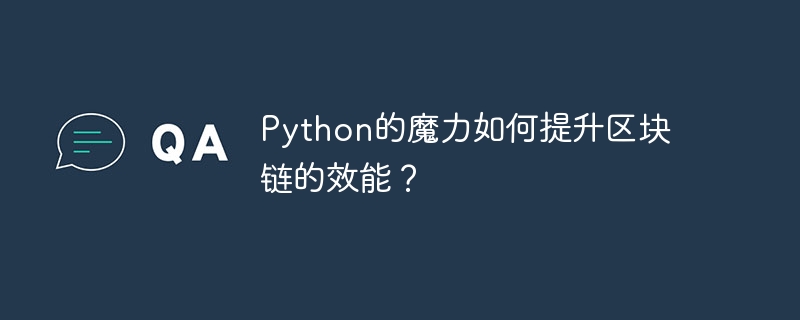Home >Backend Development >Python Tutorial >How can the magic of Python improve the performance of blockchain?
How can the magic of Python improve the performance of blockchain?
- WBOYWBOYWBOYWBOYWBOYWBOYWBOYWBOYWBOYWBOYWBOYWBOYWBforward
- 2024-03-16 21:01:081296browse

python has become an important language in blockchaindevelopment. Its powerful functions and flexibility are Emerging technologies offer unparalleled advantages. By leveraging Python's features, developers can create more efficient, scalable, and secure blockchain solutions.
Section 1:
1. Scripting and Automation: Python is a scripting language that enables developers to quickly write and execute automated tasks. This is critical for blockchain development as it involves repetitive tasks such as creating smart contracts, processing transactions, and monitoringnetwork health. Python's scripting capabilities simplify these processes, saving time and effort.
2. Data processing and analysis: Python excels in data processing and analysis. Blockchain generates large amounts of data, which needs to be analyzed and processed efficiently. Python provides a range of data processing libraries that enable developers to extract insights, identify trends and predict future patterns. This helps optimize the blockchain system and make data-driven decisions.
3. Artificial Intelligence and Machine Learning: Python is popular for Artificial Intelligence (ai) and Machine Learning (ML) choose. Blockchain can benefit greatly from integrating these technologies, for example by leveraging machine learningalgorithms to detect fraudulent transactions or optimize consensus mechanisms. Python provides a robust platform for AI and ML, enabling developers to create intelligent and adaptive blockchain solutions.
Section 2:
4. Cross-platform compatibility: Python is a cross-platform language, which means it can run on a variety of operating systems , including windows, MacOS and linux. This provides flexibility to blockchain developers as it allows them to develop and deploy their applications on any platform without recoding. It promotes collaboration and makes code portability easier.
5. Community support: Python has a large and active community that provides support, resources, and documentation. Blockchain developers have access to extensive forums, documentation, and tutorials to help them learn Python and solve any problems they encounter. This community support is critical to speeding up the development process and ensuring code quality.
6. Scalability and concurrency: Python’s Concurrency features enable it to handle multiple tasks, thereby improving the efficiency of the blockchain system. It allows developers to create applications that can handle multiple transactions or queries simultaneously, thereby increasing throughput and reducing latency. This is crucial for scalability and high-performance blockchains.
Section 3:
7. Blockchain-specific frameworks: The Python community has developed many blockchain-specific frameworks, such as WEB3.py and Ethereum-py. These frameworks provide tools and libraries tailored for blockchain operations, simplifying smart contract development, transaction management, and network interaction. They enable developers to quickly build fully functional blockchain applications while saving development time and effort. Summarize: Python has become a powerful tool for blockchain development, and its rich features can significantly improve blockchain performance. Through scripting, data analysis, AI/ML integration, cross-platform compatibility, community support, and extensibility, Python enables developers to create more efficient, smarter, more secure, and more scalable regions. Blockchain solutions. As blockchain technology continues to evolve, Python's position is likely to continue to strengthen, providing critical support to this growing industry.
The above is the detailed content of How can the magic of Python improve the performance of blockchain?. For more information, please follow other related articles on the PHP Chinese website!
Related articles
See more- What is the role of blockchain technology?
- Blockchain and smart contract technology in PHP
- Practical Notes on Blockchain Technology: Sharing Go Language Development Experience
- Getting Started Guide to Blockchain Development (Go Language Edition)
- Exploration and practice of combining Go language and blockchain technology

